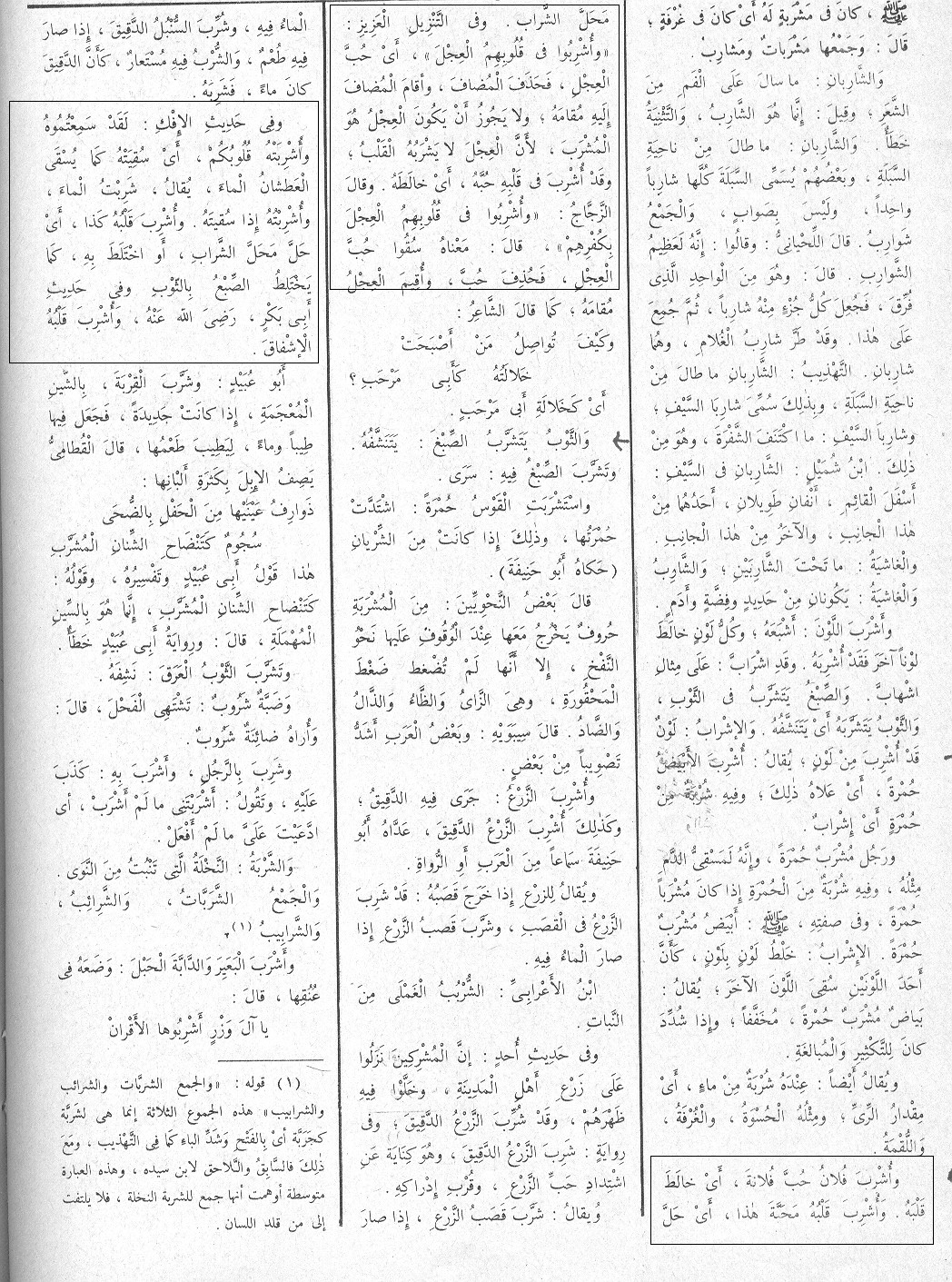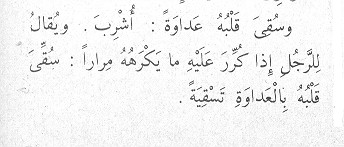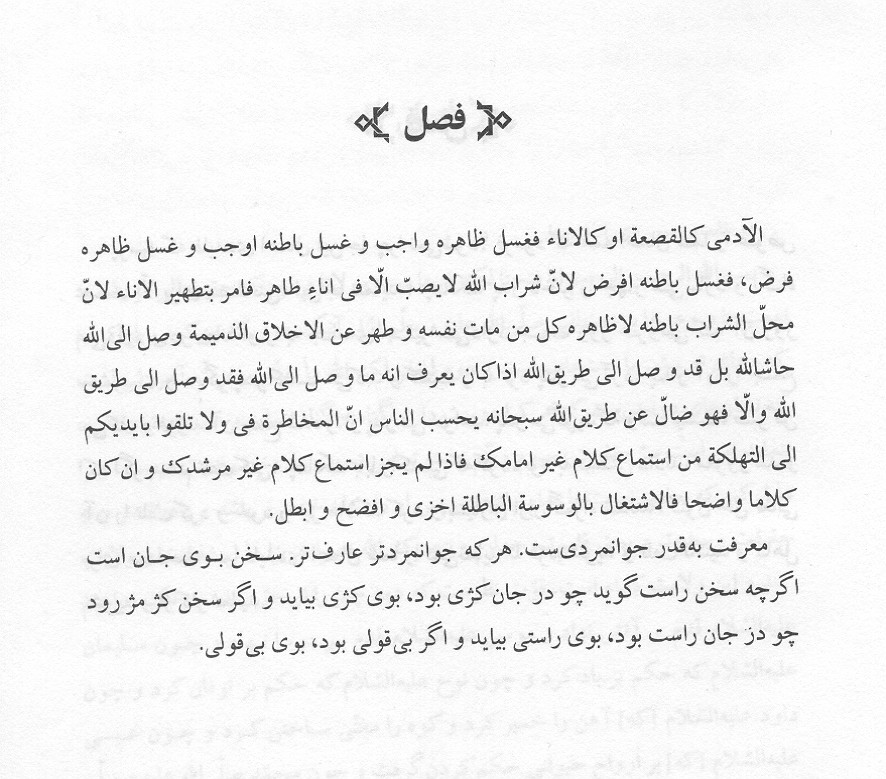
Fihe Ma
Fih
The Cleansed Cup
Apercu
Discussion
Join
Humanity—likeness of being a
human being—is that of a receptacle or a drinking cup, washing its
exterior necessary while washing its interior a must, washing its
exterior an ordinance while washing its interior a Divine Ordinance.
Indeed Allah’s Sharāb (Drink) [1]
pours forth not except within a cleansed cup, and therefore IT issued a
command to wash the cups thoroughly since the place for the drink is
the container’s interior space not its exterior surface.
Whomsoever his Nafs (Psyche)
died and cleansed his Self from blameworthy behavior Wasl (Reaches) to
Allah, God forbid! [2] Wasl (Reaching) the Tariq
(Path) of Allah. If truly he understands, he reaches not Allah but
indeed can only reach the path towards Allah. Otherwise he is lost not
finding the path of Allah—The Praiseworthy One.
Allah holds responsible those
who become adventurous around IT. “And
make not your own hands contribute to (your) destruction” [3] by listening to the words of those other than your
Imam (Front Guide). Because it is not permissible for you to listen to
the instructions of anyone other than your Morshid (Spiritual Guide),
even if it was clear discussion, nothing but useless
whispers—humiliation and disgrace and vanity.
Ma’refat (Divine Gnosis) is
directly proportional to Spartan-ship of the person, the more the
person is hardy & undaunted the more he is an ‘Āref (Divine
Cognoscente). [4]
Words are the scent of the
soul! If the words are the truth, but within the soul there is
crookedness (dishonesty), then the words have the stench of
crookedness. If the words are crooked, whilst within the soul there is
truth, then the words have the fragrance of the truth. And if within
there are no words, then the scent of wordlessness is smelled.
End.
Apercu
Your words are not the words
of yours, they are the effervescence of what is within—Fragrance or
stench. When they aerially leave your mouth, no longer something of
yours indeed an acoustic arrow thrown at your Soul.
A Morshid (Spiritual Guide)
listens not to your words, instead listens to your Soul. Know Dervish
that your words are what is keeping you from the Path! Your words are
not the same as your heart, though the Morshid (Guide) can smell their
sounds to sense what is immured inside.
You may be lying but your
words redolent of the truth blooming within.
You may be saying the truth,
but your words reek of the lies rotting within.
You may be silent, but so many
may hear your silence aloud.
[1] The
first half of this speech is given in full Arabic!? In this book and in
general in most of Rumi’s work this is rare. Perhaps there was a
problem, perhaps someone Arab was addressed specifically or perhaps
this was to speak with absolute precision about the Sufi verbiage of
terms like Sharāb (Drink) or Wasl (Reaching, Connecting).
Sharāb (Drink) (Lesānol
‘Arab, The Language of The Arab)
In Arabic the term “he drank
the love of so and so” means to immix the love of that person in his
heart or “his heart drank the love of so and so” and this drinking
conveys the concept of dissolving love within someone’s heart as though
a container. As was revealed, “And
they (followers of Moses) had to drink into their hearts the calf"
(Koran [2:93]) namely the love of the calf. There is no way the calf
can be drunk, in other words the love of the calf was a drink to immix
in their hearts so to say and the word love is omitted.
“His heart was given the drink
of enmity” means repeatedly he hated (exposed to what he hated) in his
heart like repeatedly irrigating a field or giving water to someone.
When someone says, “I drank
water and consequently satiated by this drinking” is similar to the
drinking of the heart as such i.e. the place for the drink (to satiate,
to dip in to wet) or to immix same as mixing the dye with the fabric,
as was conveyed in the Hadith (Prophet Narration) by Abu Bakr, “His
heart (Prophet?) drank the compassion” i.e. his heart was dyed with
compassion like a fabric immersed within a dye solution.
Drinking also means
understanding as was said by Abu ‘Amr. He finished drinking a drink
means he understood. (I am pretty sure about this translation but needs
more attention to make sure it is correct, Translation?)
As one reads through these
description almost verbatim Rumi was describing the human heart in the
context of the Arabic word Sharāb (Drink) and perhaps that is why that
part of the text was in full Arabic.



[2] There
is a history of misguided and lost Sufis who talked about ‘reaching
IT’. Rumi talks like them and then yells the phrase “God Forbid”,
apparently this was as speech he was giving and this was his way to
attract the attention of the audience. Therefore the Morid (Seeker) can
only reach the beginning of the Path and s/he can never reach IT by no
means possible. And as Rumi contributes the Morid (Seeker) needs the
instructions of a Morshid (Guide) to find the beginning of the path. On
the path there is no enough space for two people, so Morid (Seeker)
walks alone without his/her Morshid (Guide) even without his/her own
Nafs (Psyche).
[3] “And make not your own hands contribute to
(your) destruction” is verbatim from Koran [2:195]. This is a
Sufi technique to juxtapose Koran in the Sufi text, this style is both
used in poems as well as in prose.
[4] Present
understanding of an ‘Āref (Divine Cognoscente) is someone recluse with
deep mysterious knowledge. Indeed as we read from Rumi as well as many
other source, the ‘Āref (Divine Cognoscente) is a brave JawanMard
(Spartan) ready to give up his life at any moment for any cause as long
as his life would serve the needs or few friends of That Beloved. Sufi
JawanMard (Spartan) does not fight with weapons, he does not fight
along side anyone, he is invisible to his enemies until when his moment
arrives—suddenly he can be seen—the enemy would rain him with bullets
and like a bird he flies away from the broken cage of his body to his
Beloved.
©
2004-2002, Dara O. Shayda






